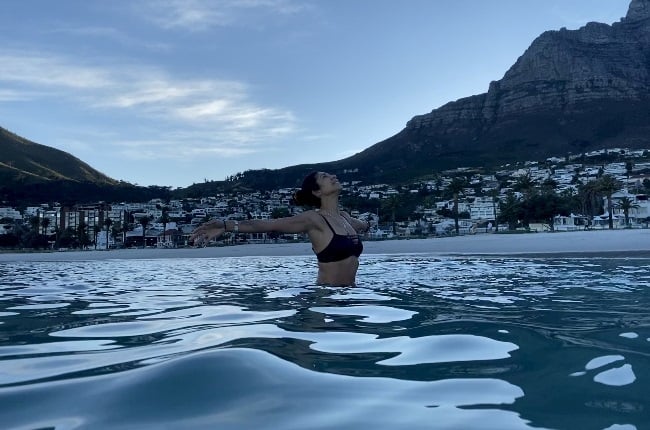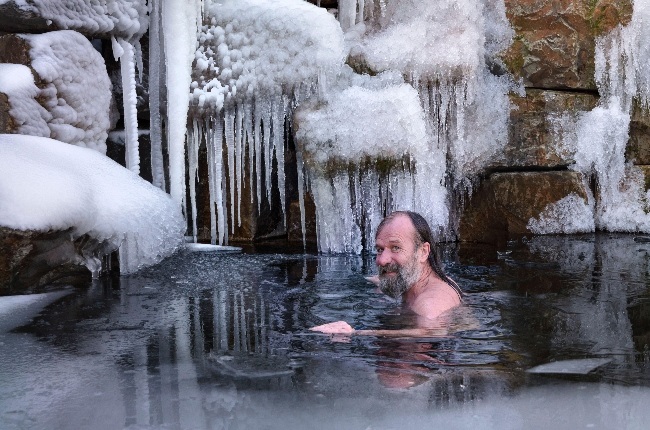
Those who do it say it’s life-changing. Once you push through the discomfort, they say, the reward is more than worth it.
That was certainly the case for Dr Leila Sadien, who decided to brave the cold ocean waters at Bakoven beach in Cape Town towards the end of 2020. “There was just an incredible sense of euphoria after the pain of the cold wore off,” she says.
READ MORE| Swimming sensation Lara van Niekerk on why medals don't matter and how her family keeps her humble
The exhilaration of the experience made her go back and do it again the very next day. And every day after that for the next two weeks.
“After about a week I noticed that my skin was firmer and I felt lighter. I felt happier and had a more consistent energy through the day. The time it took to settle into the cold had dramatically reduced – I could get all the way in much faster and would no longer feel muscle spasms in response to the cold.”
Leila’s partner is a surfer and he’d regularly go for a quick surf before work or even at night. “I’d sit on the beach and watch him from the safety and warmth of a blanket. Then one day I decided I didn’t want to limit my joy because I was afraid of the cold.
“I made a commitment to go into the sea for a few seconds every day and slowly increase my tolerance to reach 10 minutes.
“Over time I noticed I had a massively increased tolerance to cold. In winter I no longer slept with an extra blanket, I wore fewer layers and in summer I would need to sleep with a window open.”
For journalist Pieter van Zyl, swimming in the cold Atlantic Ocean was a way to deal with the effects of the dark days of SA’s hard lockdown. During the early months of the pandemic he’d stare at the ocean from his apartment opposite Sea Point promenade in Cape Town.
“A friend and I decided to swim in the ocean as soon as the beaches were reopened. When we started, winter was just setting in and it was only us and a few long-distance swimmers. The water was bitterly cold, I think around 11 degrees.”
Regular cold dips became part of his daily routine and helped him “not to lose my mind” during lockdown.
READ MORE| Hard work pays off for Comrades winner Tete Dijana
“The exercise, the life- affirming reaction of your body and mind to the cold water, being outside in nature, getting up early to see the sunrise – it was just what my mind and body needed,” Pieter says.
“I immediately felt my mood improve, my mind was clearer and I had more energy. Over time I realised my chronic depression was greatly minimised.”
Pieter and Leila are just two of many people enjoying the benefits of cold-water immersion.
The benefits of cold-water therapy, which includes not only cold-water swimming but also ice baths and cold-water plunge pools, are not new.
Research has shown it includes reduced muscle pain, reduced fatigue, reduced inflammation, improved lymphatic circulation and improved metabolism. Natural pain relief and an increased libido for men can also be counted among its benefits.
Dr Sean Gottschalk, a specialist emergency physician who has accompanied ice swimmers to Antarctica, the Himalayas and Mount Everest, explains that these physical benefits are down to the numerous reflexes taking place when entering water of 13°C or less.
“The body goes into alarm mode when you hit cold water. Increased adrenalin production causes blood to move away from the peripheral areas, such as the skin, and towards core organs, such as the heart and lungs.”
The process, which is known as the diving reflex, is triggered by the vagus nerve, the body’s communication highway and part of the parasympathetic nervous system.
This reflex helps calm the body, slowing the heart rate and metabolism to preserve energy consumption.
The endorphins that are triggered when one’s body goes into shock and then warms up again causes swimmers to experience what is called a “cold-water high”. Many cold-water swimmers say that for a while after their swim they are literally “buzzing”.
Swimming in cold water can aid weight loss as it burns more kilojoules than swimming in warmer water and the warming up and shivering after-wards also burn additional energy.
Added to its numerous physical benefits is the big impact it has on mental health. Research published in the British Medical Journal found regular cold-water swims are such an effective mood booster that they’re a viable alternative to antidepressants.
While cold-water swimming is relatively safe, it’s important to be sensible. Ram Barkai, a retired financial executive and the founder of the International Ice Swimming Association, warns of the possible risks posed by swimming in cold water.
“When your body hits cold water the shock can cause dramatic changes in breathing, heart rate and blood pressure. The sudden gasp and rapid breathing alone create a greater risk of drowning even for confident swimmers in calm waters,” Barkai explains.
According to Gottschalk, the biggest risks are for those who try to do too much too quickly. “Resistance to cold water needs to be built up over time. Even strong pool swimmers can get into trouble in the ocean as they’re not used to the cold or the sea conditions.”
It’s best to take it bit by bit, says Leila. “Instead of jumping into a freezing cold lake or the sea, start by turning the shower cold for 20 seconds, then add another 20 seconds until you can comfortably do two minutes.
“Once you’ve built up your tolerance, try going for a dip in a river, lake or the ocean,” Leila says. “The key is to understand that the discomfort you feel in cold water is transient and will pass. Just breathe through the sensations and when the pain ends and the body releases those endorphins, it will be so worth it.”
READ MORE| What does climate change have to do with kids and obesity? Experts weigh in
Although the optimum time you should spend in cold water to get the maximum benefits hasn’t been established, Gottschalk says it’s probably about 20 minutes.
This will differ from one person to another, however, and also depends on how cold the water is.
Keep this in mind if you want to give it a try:
- LISTEN TO YOUR BODY “Set a fixed time for how long you will stay in and don’t try to impress anybody by staying in longer,” says Ram Barkai, founder of the International Ice Swimming Association.
- WARM UP IMMEDIATELY Plan your exit and warm up as quickly as you can, says Barkai. “Make sure your warm clothes are packed in the order you’re going to put them on."
- PAY ATTENTION TO YOUR BREATHING Deep, conscious breathing is a pillar of cold water immersion, according to Dutch extreme athlete Wim Hof, who’s known as The Iceman.
- GET CHECKED Anyone can do cold-water swimming provided they are reasonably healthy. Still, specialist physician Dr Sean Gottschalk says anyone with health issues such as high blood pressure, vascular disease or a heart condition should check with a doctor first.
- BE SENSIBLE While cold water immersion is about pushing through discomfort, you should start feeling better after a few minutes. If you don’t, or you start cramping, get out of the water.
- DON’T DO IT ALONE “Take along a friend to ensure you have support if anything goes wrong,” says journalist Pieter van Zyl.
- STAY SOBER “Avoid alcohol before and after, until your body is fully recovered,” Barkai warns. “Alcohol weakens your system before a swim, even the night before.”
When your body is exposed to cold water, blood is diverted from your limbs to your vital organs to conserve heat and protect them. When there’s alcohol in your system this doesn’t happen as efficiently and your internal temperature can dip surprisingly low in cold water before you realise it.
Cold-water immersion is believed to:
- Boost energy levels
- Improve circulation
- Boost the immune system
- Improve workout recovery time
- Deepen sleep
- Reduce inflammation
- Improve metabolic function
- Improve mood




 Publications
Publications
 Partners
Partners


















